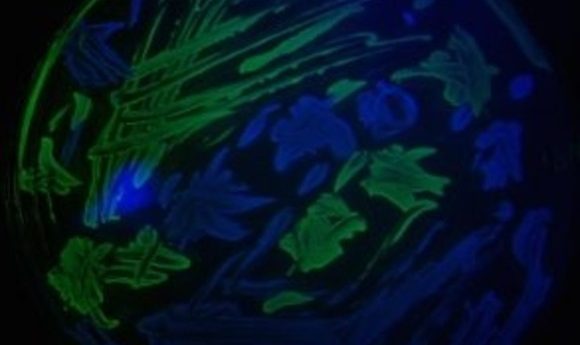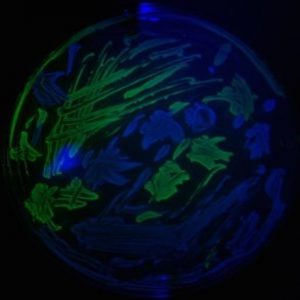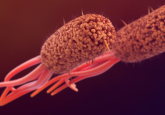Antibiotics can increase bacterial growth

While investigating the rapid evolution of antibiotic resistance in bacteria, researchers found that some antibiotics actually stimulate bacterial growth under the right conditions.

Drug resistant (green) and drug sensitive (blue) E. coli.
Credit: The University of Exeter.
Although antibiotics commonly treat a wide range of harmful bacterial infections, new research suggests that they may also act as bacterial stimulants under the right conditions. A new study published in Nature Ecology & Evolution demonstrates that E. coli exposed to antibiotics rapidly evolves genetic mutations needed for antibiotic resistance while simultaneously tripling in population size.
“We as humans have this clinical perspective of what antibiotics are in the sense that for us they stop bacteria growing. But for bacteria I think antibiotics may be something else,” said Robert Beardmore, who led the study at the University of Exeter. “Antibiotics might be a range of things, from a warfare agent, communication molecule…or perhaps a stimulant under the right conditions, which is the case here.”
Beardmore’s team exposed E. coli to 8 rounds of the common antibiotic, doxycycline over the course of 4 days. During that time, they measured growth rate and repeatedly sequenced DNA samples from the culture to understand how quickly potential genetic mutations for doxycycline resistance developed.
Beardmore’s lab first observed antibiotic resistance emerging after each dose due to upregulation of efflux pumps, which help pump antibiotics out of the cell. The team also observed that dormant viral DNA normally found in the E. coli genome was rapidly lost during antibiotic exposure. Beardmore believes the viral DNA was selected against to increase metabolic efficiency in the antibiotic environment.
“The E. coli responded to the drugs rapidly in an irreversible way almost overnight,” said Beardmore. “So, in a clinical setting during those early time points of a treatment, this shows that it is critical to get the drug right as soon as possible because you can have irreversible adaptive changes during those first couple of days of treatment.”
“Bacteria use antibiotics for a variety of means, and we have not worked out all those means yet,” he said. “That is what we are trying to do now.”





